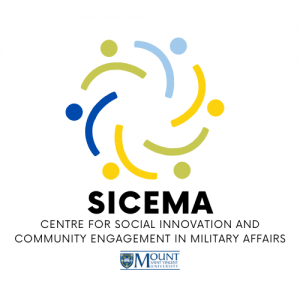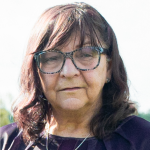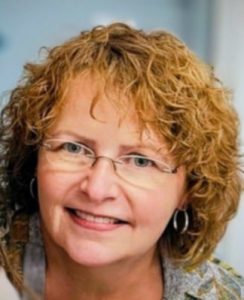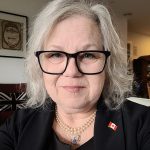
Meet the Team

Maya Eichler is an associate professor of Political Studies and the chair of the Department of Women’s Studies at Mount Saint Vincent University (Halifax, Canada). She is also the director of the Centre for Social Innovation and Community Engagement in Military Affairs and Co-Lead of the Invisible No More project. Her research focuses on women veterans, gender and the armed forces, military sexual violence, military-to-civilian transitions, transforming military cultures, defence policy, and community stories of war and peace. She has (co-)edited several books and journal special issues, including special issues of Atlantis: Critical Studies in Gender, Culture & Social Justice, the Journal of Military, Veteran and Family Health, and of the Canadian Military Journal, and the collection Speaking Up: New Voices on War and Peace in Nova Scotia (Nimbus 2022). For her research on military sexual assault cases at the Veterans Review and Appeal Board, she received the 2021 J.E. Hodgetts Award for the finest English article appearing in the journal Canadian Public Administration.
 Karen Breeck is a retired senior medical officer with a master’s degree in health sciences – specifically occupational health. She is a recognized advocate for equity, accountability, and systemic reform in defence and veteran spaces. As Veteran Co-Lead on the Invisible No More project, she brings strategic insight, lived experience, and a passion for advancing participatory, evidence-based research—research that embodies the principle “Nothing About Us, Without Us” by centering women Veterans as co-creators in addressing the challenges that disproportionately impact them. She also co-chairs the Women Veterans Research and Engagement Network, a collaborative initiative with Dr. Maya Eichler and the National Association of Federal Retirees, and is a proud member of the Federation of Medical Women of Canada. She is also now a member of the Centre for Social Innovation and Community Engagement in Military Affairs (SICEMA) at Mount Saint Vincent University.
Karen Breeck is a retired senior medical officer with a master’s degree in health sciences – specifically occupational health. She is a recognized advocate for equity, accountability, and systemic reform in defence and veteran spaces. As Veteran Co-Lead on the Invisible No More project, she brings strategic insight, lived experience, and a passion for advancing participatory, evidence-based research—research that embodies the principle “Nothing About Us, Without Us” by centering women Veterans as co-creators in addressing the challenges that disproportionately impact them. She also co-chairs the Women Veterans Research and Engagement Network, a collaborative initiative with Dr. Maya Eichler and the National Association of Federal Retirees, and is a proud member of the Federation of Medical Women of Canada. She is also now a member of the Centre for Social Innovation and Community Engagement in Military Affairs (SICEMA) at Mount Saint Vincent University.

Kimberley Smith-Evans is Research Manager at the Centre for Social Innovation and Community Engagement in Military Affairs (SICEMA) at Mount Saint Vincent University. She holds a BA (Hons.) in Psychology and a MA in Family Studies and Gerontology. Her Master’s thesis research examined the role of spousal support in the development of post-traumatic growth among military Veteran couples living with post-traumatic stress disorder. As Research Manager, Kimberley oversees and manages the research and administrative aspects of all projects at SICEMA.
 Karen D. Davis brings her experience as a non-commissioned member and officer in the Canadian Armed Forces, and as a social scientist in the Department of National Defence to the team. She has conducted and led numerous domestic and international research projects exploring gendered experiences of military women. Her MA in sociology from McGill University and PhD in War Studies at the Royal Military College of Canada placed particular focus on the analyses of institutional frameworks and barriers to gender equity in the Canadian military.
Karen D. Davis brings her experience as a non-commissioned member and officer in the Canadian Armed Forces, and as a social scientist in the Department of National Defence to the team. She has conducted and led numerous domestic and international research projects exploring gendered experiences of military women. Her MA in sociology from McGill University and PhD in War Studies at the Royal Military College of Canada placed particular focus on the analyses of institutional frameworks and barriers to gender equity in the Canadian military.
 Crystal Harris retired from the Canadian Armed Forces as a Chief Warrant Officer in 2024, completing 33 years of service. Her career began as a Supply Technician and at retirement she served as the Chief Professional Conduct and Culture Director General Culture Change Chief Warrant Officer. Crystal was a member of the Schedule O Heyder Beattie Implementation Committee. She represented the Canadian Armed Forces internationally as a Gender Advisor and at the NATO Committee on Gender Perspectives, Women Peace and Security. Crystal holds a Certificate in Military Studies from the Royal Military College of Canada, the NATO Operational Gender Advisor qualification and a Certificate in Diversity, Equity, and Inclusion: Dialogue for Change from Cornell University. Crystal remains committed to improving the lives of women in uniform.
Crystal Harris retired from the Canadian Armed Forces as a Chief Warrant Officer in 2024, completing 33 years of service. Her career began as a Supply Technician and at retirement she served as the Chief Professional Conduct and Culture Director General Culture Change Chief Warrant Officer. Crystal was a member of the Schedule O Heyder Beattie Implementation Committee. She represented the Canadian Armed Forces internationally as a Gender Advisor and at the NATO Committee on Gender Perspectives, Women Peace and Security. Crystal holds a Certificate in Military Studies from the Royal Military College of Canada, the NATO Operational Gender Advisor qualification and a Certificate in Diversity, Equity, and Inclusion: Dialogue for Change from Cornell University. Crystal remains committed to improving the lives of women in uniform.
 Hélène Le Scelleur is a Veteran of the Canadian Armed Forces (Captain) and a doctoral candidate in social work at the University of Ottawa. Since 2020, she has been actively engaged with various veteran organizations and research projects as a veteran collaborator. She brings to this work 26 years of lived experience with chronic pain and PTSD, along with a deep understanding of the barriers Women Veterans encounter in accessing care. She is a member of the first Women Veteran Council at Veterans Affairs Canada.
Hélène Le Scelleur is a Veteran of the Canadian Armed Forces (Captain) and a doctoral candidate in social work at the University of Ottawa. Since 2020, she has been actively engaged with various veteran organizations and research projects as a veteran collaborator. She brings to this work 26 years of lived experience with chronic pain and PTSD, along with a deep understanding of the barriers Women Veterans encounter in accessing care. She is a member of the first Women Veteran Council at Veterans Affairs Canada.
 Nancy Taber is a professor at Brock University in the Department of Educational Studies. Her qualitative and fiction-based research explores the ways in which learning, gender, and militarism interact in daily life, popular culture, museums, academia, and military organizations. She has a particular focus on women’s experiences in the Canadian Armed Forces as relates to organizational culture, policies, education, and practices. She is a retired military officer (Sea King helicopter air navigator) and a former co-director of the Transforming Military Cultures network. Her debut novel, A Sea of Spectres, is published with Acorn Press.
Nancy Taber is a professor at Brock University in the Department of Educational Studies. Her qualitative and fiction-based research explores the ways in which learning, gender, and militarism interact in daily life, popular culture, museums, academia, and military organizations. She has a particular focus on women’s experiences in the Canadian Armed Forces as relates to organizational culture, policies, education, and practices. She is a retired military officer (Sea King helicopter air navigator) and a former co-director of the Transforming Military Cultures network. Her debut novel, A Sea of Spectres, is published with Acorn Press.
 Darlene Worth is a retired RCMP Civilian Member. She is a former SSHRC fellow and summa cum laude graduate of the University of Ottawa, where she earned her PhD in Industrial/Organizational Psychology. She has taught at the University of Ottawa and Saint Mary’s University, Halifax, and was Vice President of the HR Association of Nova Scotia, receiving her Certified HR Professional (CHRP) designation in 2001. Currently Co-Chair of the RCMP Veteran Women’s Council, Darlene also instructed the psychological skills component of the RCMP Undercover Training Program and with their International Training Branch in Prague. She has served as Regional Director, Policy and Intergovernmental Relations, Health Canada Atlantic, and as the RCMP’s Atlantic Regional Director for Workplace Relations Management.
Darlene Worth is a retired RCMP Civilian Member. She is a former SSHRC fellow and summa cum laude graduate of the University of Ottawa, where she earned her PhD in Industrial/Organizational Psychology. She has taught at the University of Ottawa and Saint Mary’s University, Halifax, and was Vice President of the HR Association of Nova Scotia, receiving her Certified HR Professional (CHRP) designation in 2001. Currently Co-Chair of the RCMP Veteran Women’s Council, Darlene also instructed the psychological skills component of the RCMP Undercover Training Program and with their International Training Branch in Prague. She has served as Regional Director, Policy and Intergovernmental Relations, Health Canada Atlantic, and as the RCMP’s Atlantic Regional Director for Workplace Relations Management.
 Caleigh Wong is a critical military studies scholar who has recently completed her Master’s in Political Science from McGill University where she attended as a McCall MacBain Scholar. She has testified on parliamentary studies, spoken to the Prime Minister, and published in a number of journals on the topic of Canadian military culture and reform failure. Caleigh is the co-founder of the Asian Resilience Collective Canada, a non-profit focused on supporting Asian-Canadian civic engagement, and she currently works as a Veteran Project Partner at the Centre for Social Innovation and Community Engagement in Military Affairs.
Caleigh Wong is a critical military studies scholar who has recently completed her Master’s in Political Science from McGill University where she attended as a McCall MacBain Scholar. She has testified on parliamentary studies, spoken to the Prime Minister, and published in a number of journals on the topic of Canadian military culture and reform failure. Caleigh is the co-founder of the Asian Resilience Collective Canada, a non-profit focused on supporting Asian-Canadian civic engagement, and she currently works as a Veteran Project Partner at the Centre for Social Innovation and Community Engagement in Military Affairs.
 Julianne Acker-Verney is completing her PhD in Educational Studies at Mount Saint Vincent University in Halifax, Nova Scotia. Julianne has over 25 years of experience developing programs and services and researching issues of importance to Canadians with disabilities including peer support, employment, food security and supporting diverse women with disabilities to participate in research. Julianne has engaged with social justice issues in all phases of her life through entrepreneurship, volunteerism and scholarship.
Julianne Acker-Verney is completing her PhD in Educational Studies at Mount Saint Vincent University in Halifax, Nova Scotia. Julianne has over 25 years of experience developing programs and services and researching issues of importance to Canadians with disabilities including peer support, employment, food security and supporting diverse women with disabilities to participate in research. Julianne has engaged with social justice issues in all phases of her life through entrepreneurship, volunteerism and scholarship.
 Chris M. Edwards is a postdoctoral researcher and Clinical Exercise Physiologist. She is strongly influenced by her work with military personnel and Veterans from conventional and Special Operations units, as well as her time supporting members from organizations such as NATO, NASA, the Royal Canadian Mounted Police, and first-responder agencies worldwide. Her current research focuses are: i) the unique needs of females serving as military and emergency response personnel; ii) musculoskeletal injury and the performance of mission-critical team personnel; iii) treatments for pelvic floor-related issues in servicewomen and Veterans; and iv) multidisciplinary care for women Veterans with chronic pain.
Chris M. Edwards is a postdoctoral researcher and Clinical Exercise Physiologist. She is strongly influenced by her work with military personnel and Veterans from conventional and Special Operations units, as well as her time supporting members from organizations such as NATO, NASA, the Royal Canadian Mounted Police, and first-responder agencies worldwide. Her current research focuses are: i) the unique needs of females serving as military and emergency response personnel; ii) musculoskeletal injury and the performance of mission-critical team personnel; iii) treatments for pelvic floor-related issues in servicewomen and Veterans; and iv) multidisciplinary care for women Veterans with chronic pain.
 Tammy George is an assistant professor in the School of Kinesiology at York University. She is an interdisciplinary scholar who works alongside veterans and military service members as a researcher and is a psychotherapist engaged with trauma informed approaches for veteran mental health. Currently, her research interests lie at the intersection of critical military studies, racial violence and mental health with a focus on the materialities of the post 9/11 era warmaking and military harm. She is the former co-director of Transforming Military Cultures and has been involved with several initiatives such as, panels, Ministerial roundtables, conferences, working papers, and as an invited speaker on several occasions with the 32 Canadian Forces Health Services (CF H Svcs C) Pilot Anti-Racism Strategies Workshop.
Tammy George is an assistant professor in the School of Kinesiology at York University. She is an interdisciplinary scholar who works alongside veterans and military service members as a researcher and is a psychotherapist engaged with trauma informed approaches for veteran mental health. Currently, her research interests lie at the intersection of critical military studies, racial violence and mental health with a focus on the materialities of the post 9/11 era warmaking and military harm. She is the former co-director of Transforming Military Cultures and has been involved with several initiatives such as, panels, Ministerial roundtables, conferences, working papers, and as an invited speaker on several occasions with the 32 Canadian Forces Health Services (CF H Svcs C) Pilot Anti-Racism Strategies Workshop.
 Ruth Stanley-Aikens is a Special Advisor on Trauma – Sexual Misconduct Support and Resource Centre. Ruth worked as a trauma psychotherapist Social Worker with the Operational Trauma and Stress Support Centre of CF H Svcs C (O), until she retired in 2015. She returned in October 2016 to the Sexual Misconduct Response Centre. Ruth’s extensive experience working with survivors of trauma contributes to the knowledge base of the Sexual Misconduct Response Centre. Ruth was awarded the King Charles III Coronation medal for contributions to trauma-informed practices within the CAF. Her area of clinical practice focuses on the sequelae of sexual and war-related trauma, with particular emphasis on care delivery for members with dissociative coping structures.
Ruth Stanley-Aikens is a Special Advisor on Trauma – Sexual Misconduct Support and Resource Centre. Ruth worked as a trauma psychotherapist Social Worker with the Operational Trauma and Stress Support Centre of CF H Svcs C (O), until she retired in 2015. She returned in October 2016 to the Sexual Misconduct Response Centre. Ruth’s extensive experience working with survivors of trauma contributes to the knowledge base of the Sexual Misconduct Response Centre. Ruth was awarded the King Charles III Coronation medal for contributions to trauma-informed practices within the CAF. Her area of clinical practice focuses on the sequelae of sexual and war-related trauma, with particular emphasis on care delivery for members with dissociative coping structures.